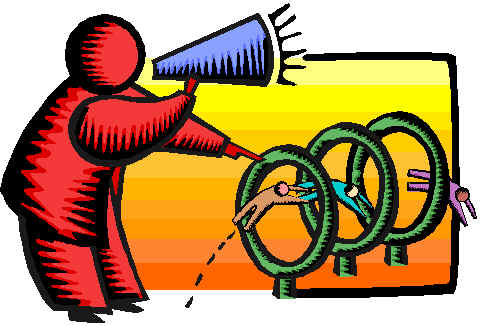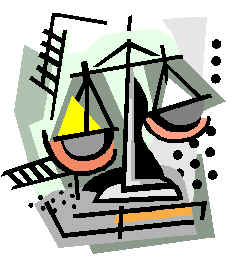|
I WON but do not like one aspect of the Judge's ruling.
Can I appeal, even though I WON?
| Yes--either side can appeal. But if you appeal it is more likely that the other side will ALSO appeal -- the parts of the decision that you LIKE. There can be no guarantees as to who would win. |
Can I appeal without a lawyer?
| Yes, you can appeal without a lawyer. But, as you will see from examining the procedures on this web page, if you do not have an attorney it is likely that you will miss something that must be done. Non-lawyers are not excused from following all of the procedures exactly as required. |
Should the same lawyer do the appeal that did the trial? Or should I get someone new?
| There are advantages and disadvantages to using the same lawyer on appeal. There are lawyers who specialize in appeals, and a new lawyer can look at your case from a different perspective. You should not change lawyers just because your trial lawyer lost, however. He or she also feels a sense of loss--and thoroughly knows your case, and may also fight the appeal with more vigor because of the loss at trial level. Your trial lawyer also may be really convinced of the errors the judge or jury made, and/or in the justice of your cause. |
How much will an appeal cost?
| It depends. Appeals are expensive. In our area of Missouri, the filing fee is now (when this information was posted) $50.00. You will have to pay to have the transcript of your trial typed up--which might be about $800 or $900 for each day of trial. The "Legal File" -- which is a copy of all of the pleadings and exhibits has to be prepared and copied. Appellant's Briefs are usually forty or fifty pages, and there must be ten copies for the Court of Appeals, your own lawyers, and two for each of the lawyers for the opposing side.
And none of those costs include your attorney's time -- which for a simple appeal would easily be twenty or thirty hours or more. It depends on the complexity of the issues you are appealing, the length of the trial and of the trial transcript.
The attorney must sort through all of the records, determine which legal argument is most likely to help you obtain your goal, and then relate the pleadings, exhibits, and testimony in the transcript to each of the legal arguments in the specific way the Court rules require. Even if he or she was your attorney at trial, that takes a lot of time. |
Will I get my money back if I win?
Can the judgment of the trial court or jury be collected -- or enforced -- while the case is on appeal?
| Generally, yes....unless the person who appeals files a bond, in an amount set by the trial Judge. There are exceptions, when the appeal involves certain probate and domestic matters. Filing a bond will not stop a change of custody during the appeal.
If the person who collects a judgment loses the right to money or property on appeal, he would have to pay it back or return the property. Sometimes, obtaining a return or refund is impossible, making the appeal useless. |
Information, Deadlines and Time Frames for Appealing
There are exceptions for different matters, and types of review requested.
Some of the deadlines are often extended. Some are almost never extended.
|
Every state, and even courts within each state may have different rules. The outline here is a general checklist for the State of Missouri, (Supreme Court) and the Appellate Court in the Southern District at the time this page was prepared.
|
| THE APPEAL PROCESS DOES NOT USUALLY REQUIRE THE CLIENTS TO DO ANYTHING!
There are many misunderstandings because the client feels like he should be doing something during the long period that the appeal is pending.
Writing the Appellant's Brief is the most difficult, demanding and time-consuming job in the whole process, and only your lawyer can research and write it. You will have no way to know what he or she is doing, and you will feel very frustrated.
DATES YOUR LAWYER WILL USE IN
PLANNING:
_______ date of your judgment
_______ date after trial motions were ruled on
_______ + thirty days (your judgment is final)
_______ + ten days= date Notice of Appeal MUST be filed
_______ + ten days = date transcript and legal file must be ordered
_______ + ten days from date Court Reporter gives estimate, deposit must be paid
.......COURT REPORTER PREPARES TRANSCRIPT.......
_______ sixty days from date the transcript and legal file are completed, filed and served on opposing parties, the Appellant must prepare and file ten copies of Appellant's Brief with the Court, and two copies on each of the attorneys for the other sides.
_______ within thirty days from date Appellant's Brief is received, Respondent may file a Respondent's Brief
_______ within fifteen days from the date Respondent's Brief is received, the Appellant may file a Reply to the Respondent's Brief
_______ two or three months after all of the briefs have been filed, the Court MAY schedule oral argument (it must be requested).

|
- Everything starts with the date of the decree or judgment you received from the trial court. Thirty days from the date of the Judgment, the Judgment becomes final. Ten days after the Judgment becomes final, the Notice of Appeal must be filed, along with a "Civil Case Information Form." The person who files the appeal is called the "Appellant" -- no matter what he or she was called at the trial. The other side is the "Respondent" -- since that side must "respond" to the appeal of the Appellant.
- The Notice of Appeal
is a simple form, which can be obtained in the Office of the Circuit Clerk, in the county where you had your trial. The Appellant must say generally, what mistakes the judge or the jury made, and pay a filing fee of $50.00. The Circuit Clerk, after checking to be sure the Appellant is not late in filing, and has filed in the correct place, sends a copy to the Clerk of the Court of Appeals, and to all of the other parties in the law suit.
Within ten days from the date that the Notice of Appeal is filed, the Appellant must order the transcript of the trial, in writing, and file a copy of the letter ordering the transcript with the Court of Appeals, and each Respondent. The Court Reporter will require a deposit which could be a thousand dollars or more, within ten days of the date the reporter or clerk notifies the party of the amount of the deposit. The amount depends on the length of the transcript -- which depends on the length and complexity of the trial.
The "record on appeal" which is a copy of the "pleadings" and the transcript, must be filed within thirty days of the date the Notice of Appeal is filed, if there is no transcript, or within ninety days, if there is a transcript.
Within 60 days of the date the record on appeal is filed, the Appellant's Brief must be filed. The rules as to how the briefs are written are very precise.
After all of the briefs are filed, the Court of Appeals may permit oral argument. If so, a notice will be sent to the all lawyers setting a time for them to argue the merits of their respective cases.
|
|
| CONSIDERATIONS IN DECIDING TO APPEAL:
Number of days of trial?
What did you lose?
What will you gain by appealing?
What are the LEGAL mistakes that the judge or jury
made?
Even if you win the appeal, can you collect anything? Is it possible that the other side will file bankruptcy?
Will the expense of litigation force you into bankruptcy?
|
| Thank you for visiting my web site. This page was last updated on 02/6/2009.
If you have specific questions about appealing a judgment you should consult the lawyer who handled your trial. If you want a second opinion, lawyers who handle appeals, and practice in the same geographical area where you will be appealing can usually be found by consulting your local bar association, or asking your trial lawyer. |
If, after reviewing these pages, you choose to contact me, please keep your message brief. You must IDENTIFY YOURSELF. Include your City, State and Country in your email and include information in the subject line identifying the nature of your request. I do not respond to ANY messages which do not follow these guidelines, or are sent anonymously. I do not open messages which contain attachments.
A RESPONSE TO ANY MESSAGE DOES NOT MEAN THAT I AM YOUR LAWYER, OR THAT I WILL AGREE TO REPRESENT YOU IN ANY
LEGAL MATTER. IT IS EVEN POSSIBLE THAT I REPRESENT SOMEONE WITH INTERESTS ADVERSE TO YOU, AND  YOU SHOULD NOT DIVULGE INFORMATION TO ME THAT MIGHT HURT YOUR CASE. YOU SHOULD NOT DIVULGE INFORMATION TO ME THAT MIGHT HURT YOUR CASE.
All pages on this web site are for general informational purposes only. Legal concepts are based upon Missouri law, and general practice in local state and federal courts. Before applying any general legal concepts to specific facts, an attorney would have to be fully informed of the specific circumstances and goals of the individuals involved, which would include examination of relevant documents and conferring with the parties.
All text, files, elements and design on all pages at this site
Copyright © 2012 Peggy S. Hedrick
It is difficult to impossible to guarantee that copyrights related to web pages can be protected in this new technological age. If you are visiting my site and find my work to be creative, please tell me so, and give me credit if you choose to use my work in other contexts. |
|



 YOU SHOULD NOT DIVULGE INFORMATION TO ME THAT MIGHT HURT YOUR CASE.
YOU SHOULD NOT DIVULGE INFORMATION TO ME THAT MIGHT HURT YOUR CASE.